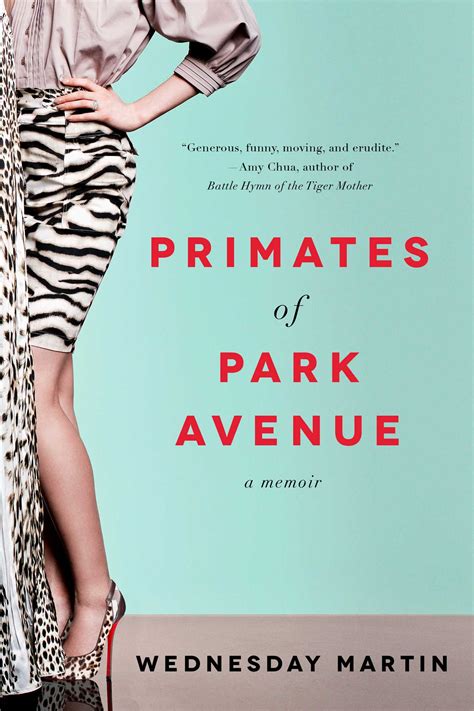“Going native” takes on a different level of research and accountability in Wednesday Martin’s sly book, “Primates of Park Avenue: A Memoir.” Martin is a writer, public expert on a host of issues, from parenting to gender to families, a researcher and cultural critic. Her background includes rigorous academic study, with an undergraduate focus in anthropology at the University of Michigan and a doctorate from Yale in cultural studies. Martin is an interdisciplinary scholar with a skill for rendering theory in accessible and humorous ways. Her book defies easy categorization, just as one my expect from the author’s background. If you are curious about the lives of extremely rich families in New York City, Primates is most worth your time and consideration.
As a straightforward interpretation of the work, Primates is a field study of the wealthy mothers who lived on the Upper East Side of Manhattan in the early 2000s. Martin, who married into New York City money, moved to the city, started a family and began a journey of friendship, competition, and socialization among an elite group of mothers. A member of the tribe, at least through her marriage, Martin brought all the tools, references and methodologies to do a serious ethnography of her new environs. What makes this book intriguing is that she isn’t just a visitor. She is one of the group, a wealthy New York mom. Possessing the analytic and reasoning skills to try to better understand and navigate her environs. Martin’s effort, restructured into this popular book, makes for an unusual read. She makes maps, tracks behavior, and is delightfully cued into issues of status, shame, networks and social power. Martin is also very good with a joke.
Primates is no dry academic text. Martin’s prose is lively . For those that haven’t read much anthropology, there is much to pick up here about how anthropologists see things and sort information. The arguments are intriguing and the references clear and understandable. Martin is not writing to impress. Her aim is clarity, providing understanding and explanation. As Martin moves from outsider to insider over the course of book, as her children make friends and age, more and different opportunities emerge for Martin’s study. She gains trust. And like many other famous anthropologists who do extended field research, she becomes more and more sympathetic to those that she is studying. Like many in her tribe, she is a smart, ambitious, highly-focused wealthy mom.
This plays out in both theory and sense-making. For example, Martin recognizes that a key moment in her acceptance in the group stemmed from the affirmation of an alpha male, an extremely wealthy dad. Arranging for a play date of their respective children gave Martin greater status. She used it, too, opening up doors to more conversations, more interactions and greater knowledge of the community.
The second key turning point in Martin’s position came from power of prized objects. In this case, it isn’t a yam – it is an expensive Birkin bag. This accessory is a required sign of status in the tribe. Purchased through her husband’s money and his connections with others (it bears stressing that males are the architects of the system and prized items are always difficult to obtain) the bag provides access and deeper knowledge of the how and why of group and personal dynamics. The final turning point in the narrative, as Martin’s children become more independent and the fixed strictures of the Upper East Side community loosen, is the tragic death in utero of what would have been her third child. The loss, as one would expect, hits Martin very hard. It is traumatic. She is grateful to her fellow mothers, who provide comfort and support.
All of this is very interesting. Setting Primates apart are two threads that Martin weaves throughout.
The first is a line of analysis grounded in Martin as a cultural critic. She questions the rules of the community. She mocks herself for wanting status and for obsessing over a expensive handbag. Accordingly, she makes fun of herself for enjoying the Birkin bag so much. Martin questions the dieting, the incessant exercising, and the omnipresent anxiety throughout the community of women. Men do not seem to have the same stresses. Martin offers more than a few “Mean Girls” references. Her critiques sharp, humorous, and very humane. After all, she is studying a most unusual community.
The second line of analysis is personal. Martin is a smart, warm woman, and it is easy to relate to her voice in the book. Doctorate and wealth notwithstanding, she wants to connect with the reader. She wants to be liked, to be accepted, and she wants what is best for her children and family. These are normal values. She readily acknowledges faults and failures. Martin wrestles with problems, wonders what is best, and opens up to the reader. Martin’s humanity shines through. It is, after all, a memoir.
Primates of Park Avenue is an inside and outside study, a look inside the townhouse by someone who wonders just what the townhouse is all about. Martin’s study, which is being made into a television series, is most interesting. Good anthropologists do fascinating work.
David Potash

